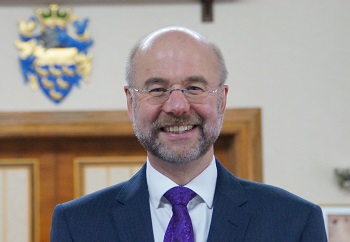
What steps has WSCC already taken to combat climate change? What other plans are in place and what are the council’s aims?
We’ve been looking at this for quite a long time and have decreased carbon emissions by half since 2010. There are big challenges, but we’ve already hit the ground running.
In 2019, we pledged to become carbon neutral by 2030 and have a £10 million fund to decarbonise our buildings.
We’ve done a lot in terms of energy efficiency – LED lighting is being rolled out and WSCC is big on renewable energy generation with our solar farms – which are also good for offsetting energy costs at the moment.
Before Covid we were already investing in technology so that staff didn’t need to travel as much, and now there’s been a big culture change.
We recently introduced carbon literacy training for 100 staff members, which is an accredited course that provides a grounding in what the issues are and what can be done by organisations. We’ve achieved a bronze accreditation – one of only 60 organisations globally to reach that point, and we’re keen to roll this out to more staff soon.
What are the main challenges for councils in combating climate change?
In some ways the challenges are not much different to those for us as citizens. We all use buildings and transport and need to feed and clothe ourselves, and in a sense councils are similar. We have hundreds of buildings and many were designed and constructed in a different era so they’re not energy efficient and were not made to be carbon neutral. We have solar panels on more than 70 of our council schools. There is a carbon cost to demolishing buildings, so it’s important to be thinking about the entire lifetime of all decisions we make.
A large part of what we do is to provide care for the elderly and vulnerable children and adults, where travel is unavoidable – we can’t do everything remotely. We need to make it as easy as possible for people who have to travel to do so in a low carbon way and increase the number of electric vehicles in our fleet. We also have a contract to provide electric charging points for private vehicles on public land and in car parks, as not everyone has a driveway where they can charge their vehicle. We’re hoping to provide thousands of new electric vehicle charging points – these should start to appear next year.
Without a doubt though the biggest challenge is resource. If we were to make the entire school estate carbon neutral we would be talking hundreds of millions of pounds to do it. We don’t have that money.
We will develop a programme and challenge government to support us. We will also need human resource – people with the right skillset to help with decarbonisation of infrastructure, travel and the promotion of natural capital and biodiversity. Internally, our carbon literacy training is a good step, but ultimately we need many more people with expertise and passion in these key areas.
What are your hopes for COP26?
As we know it’s not been a completely smooth path for this global conference. But it’s really important we emerge from COP26 with really strong commitments to action.
From a UK point of view, I hope that Glasgow hosting it will make people see it as a really important issue, as there really does need to be some personal responsibility as well. Businesses, local authorities, other public sector organisations, government and individuals – it’s going to need everyone to switch their mindset.
What do councils need from government in order to meet their environmental objectives. E.g., achieving net zero, green growth.
For a lot of green funding, councils get very little notice to bid. We also come up against the problem of government criteria where you have to spend the funding within six months, so we’re looking for some more stable policy support.
There’s no shortage of things we can bid for but it’s being able to be in a position to do that within the time frame the government is setting. So, we need more reasonable notice and time frames.
What are the main challenges for businesses in reducing their environmental impact?
Challenges for business are again similar to those for councils – mainly it is about decarbonising the built environment, reducing energy consumption and switching to renewable suppliers. Businesses need to look at their supply chains, just as councils should look at their sub-contractors. Businesses can also look at what they’re doing in terms of waste.
What support is available for businesses in the region?
In terms of local support, LoCASE (Low Carbon Across the South & East) provides free low carbon business support in the South and East, including in West Sussex, with business grants of up to £10,000 as well as training workshops and fully funded events.
Specialist support is available for companies who offer “green” or low carbon goods and services. West Sussex County Council is a Strategic Partner, and the local business support is delivered by University of Brighton’s Green Growth Platform, the South East Hub of Clean Growth UK.
Arun District Council Greener Business Grants of up to £10,000 are available to Arun-based businesses that wish to improve energy efficiency, or for larger projects such as converting to different energy methods or Electric Vehicles.
There’s lots of national support available for businesses too, including from the government’s UK Business Climate Hub, the Science Based Targets Initiative, the Carbon Trust and Zero Carbon Business.
What opportunities are there for green jobs in West Sussex?
I think the trajectory is that we need people with more skills around decarbonising the built environment and in renewables like solar and wind energy. We’ve obviously got Rampion and potentially Phase 2 in the offing. It’s a question of making sure we’re building these skills into education and training.
We’re currently in a phase where it’s a rapid period of change, and it’s always going to be turbulent until you catch up. It’s a very steep learning curve.
